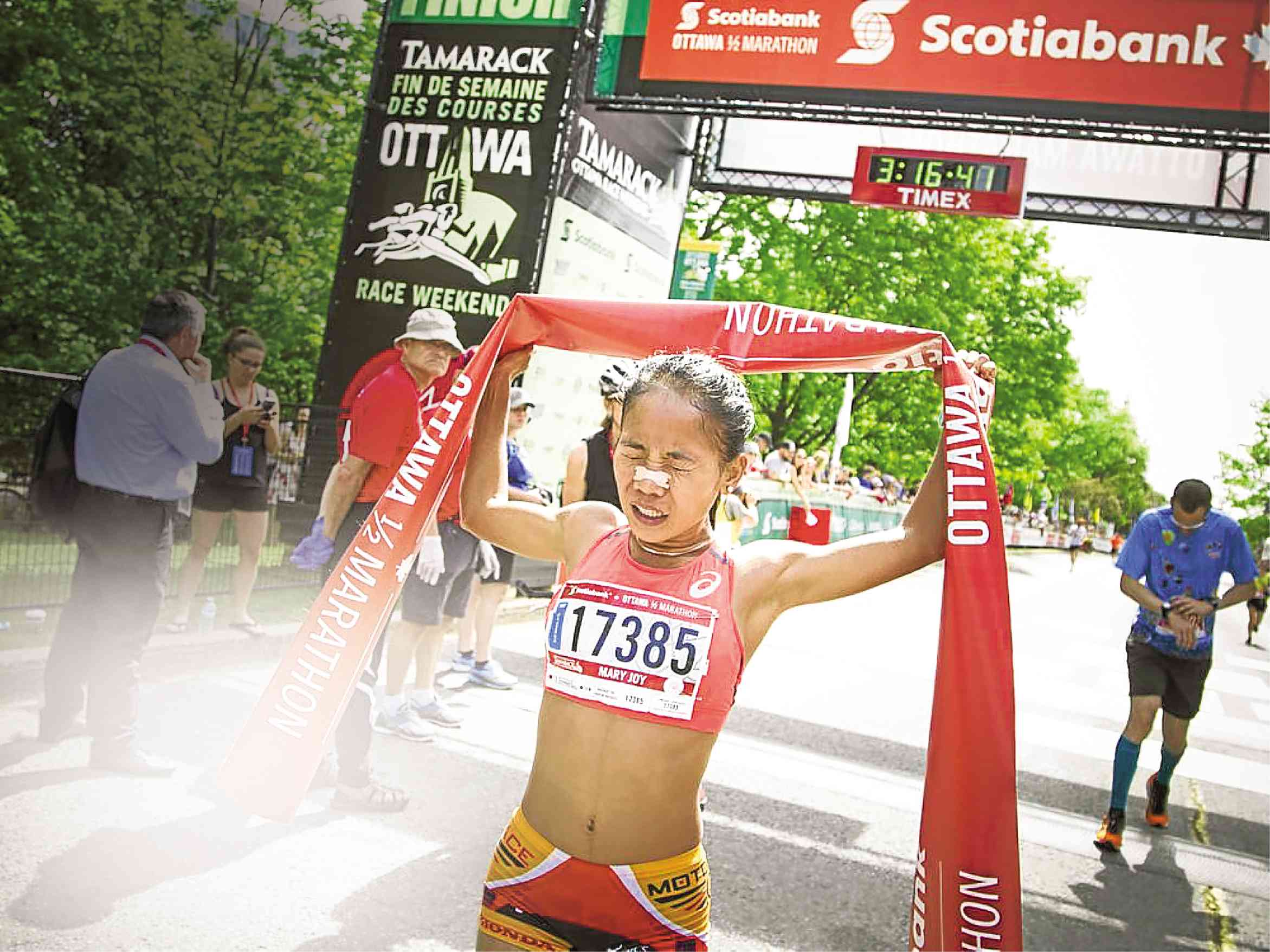
A few days after earning a spot, albeit belatedly, in the Philippine team for the coming Southeast Asian Games, the onus is now on Mary Joy Tabal to prove her worth.
On Thursday, Tabal was finally given the green light to compete in the Kuala Lumpur SEA Games—after initially being omitted from the lineup by the national athletics federation.
That snub put a long-running dispute in perspective. For all her talent, the 27-year-old Tabal is considered by running pundits as a maverick who prefers to train and race under her own rules, not her federation’s.
What went before
When she beat the qualifying time for the 2016 Rio Olympics in the Scotiabank Ottawa Marathon in Canada, Tabal also failed to earn immediate inclusion in the Olympic team because she had quit the national pool formed by the Philippine Athletics Track and Field Association (Patafa).
After a conciliation meeting with Patafa president Philip Ella Juico, Tabal won reinstatement and a spot in the 13-athlete Olympic team. But she would resign from the national athletics team again after the Olympics.
Tabal’s resignation was, according to the Patafa, the “meat of the matter” why it did not include her in the SEA Games roster. This, despite her recent victory in the half-marathon (21K) distance of the same annual footrace in Ottawa.
In explaining Patafa’s decision, Juico said that Tabal failed to rejoin the national team’s training after the Rio Olympics. Patafa did not give weight to Tabal’s alibi that she trained in the highlands near her hometown in Barangay Guba, Cebu.
“It was (Tabal) who requested that her (Patafa) membership would last only until Aug. 31 last year, or right after the Olympics,” said Juico. “That’s why we were surprised that some people spread the news that we dropped her from the national team. That’s not true.”
Tabal’s exclusion didn’t sit well with Commissioner Ramon Fernandez of the Philippine Sports Commission.
Fernandez, the PBA legend, said the Patafa decision smacked of discrimination. He noted that Filipino-American 400-meter hurdles record-holder Eric Cray and sprinter Kayla Richardson are allowed to train in the United States.
“Joy is a Filipino and represents the country in all the races that she participates in,” said Fernandez, a provincemate of Tabal. “Is there a runner in women’s marathon better than Joy?”
Patafa countered that the selection of athletes does not rest on performance alone.
“Meeting the performance standard is only the beginning of the journey to gain the privilege of being a member of any national team,” said Juico. “Among the equally important conditions…are word of honor, fidelity to the national team, respect for fellow athletes and authority, commitment to the federation and the absence of any abhorrent attitude of entitlement.”
The Patafa also claimed that, based on scientific findings, a marathoner should not run more than two full 42.195-kilometer races in a year.
Juico said that Tabal broke Patafa rules and vied in more than the required number of distance races, actions that he said could harm her career.
Fernandez countered that Tabal had not asked the Patafa to shoulder her expenses during training and while competing overseas since she has had a corporate backer in Motorace.
“We should send our best athlete (to the SEA Games) regardless if she’s a member of the national team or not,” he said.
But everything’s water under the bridge now with Tabal’s inclusion in the team. One question begs for an answer though: Is Patafa’s accommodation of Tabal proper? To put in context, does it apply to all athletes?
The here and now
Tabal is making the most out of her two-month training in Tuscany, Italy, where the finest Filipino female marathoner of her generation expects to gain more experience running with world-class athletes.
“This is a rare opportunity,” said the holder of a record four Milo National Marathon women’s titles.
“The support I’m receiving now, it means so much to me,” said Tabal. “It motivates me to keep moving forward.”
She became the first Filipino to make the podium of the Ottawa 21K, considered a “gold-label” race by the international athletics federation (IAAF).
After a silver-medal finish in the 2015 Singapore SEA Games, Tabal qualified for Rio de Janeiro by clocking two hours, 43 minutes and 29 seconds in the 2016 Ottawa full marathon.
Matching that time would be enough to win her the gold in the SEA Games. Thai Natthaya Thanaronnawat of Thailand posted 3:03:25 to rule the race in the 2015 Singapore Games, with Tabal finishing in 3:04:39.
Comply with rules
“I have to keep on dreaming and work really hard this time,” said Tabal, who has pledged to comply with Patafa’s rules.
As soon as she arrives home from Italy on Aug. 9, Tabal is expected to report to the Patafa and begin training with her coach, Rene Herrera, the former SEA Games steeplechase champion.
With all the obstacles for her participation in the SEA Games out of the way, it’s now in the hands of Tabal to deliver.

